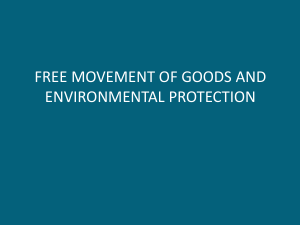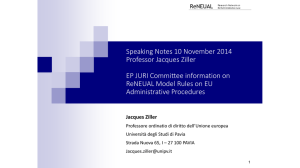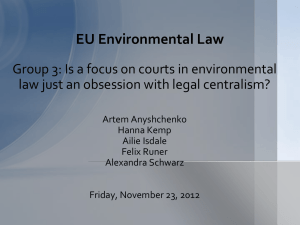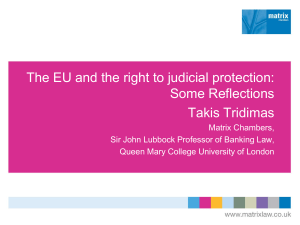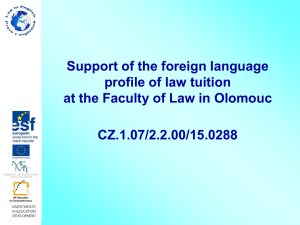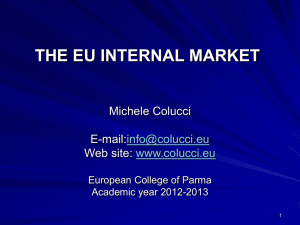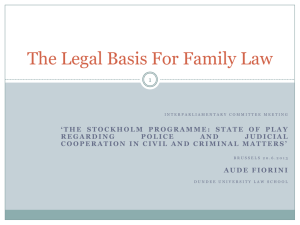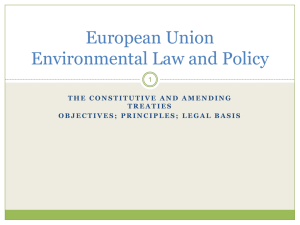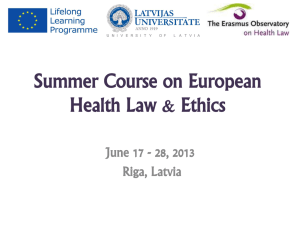AL_JURI - European Parliament
advertisement
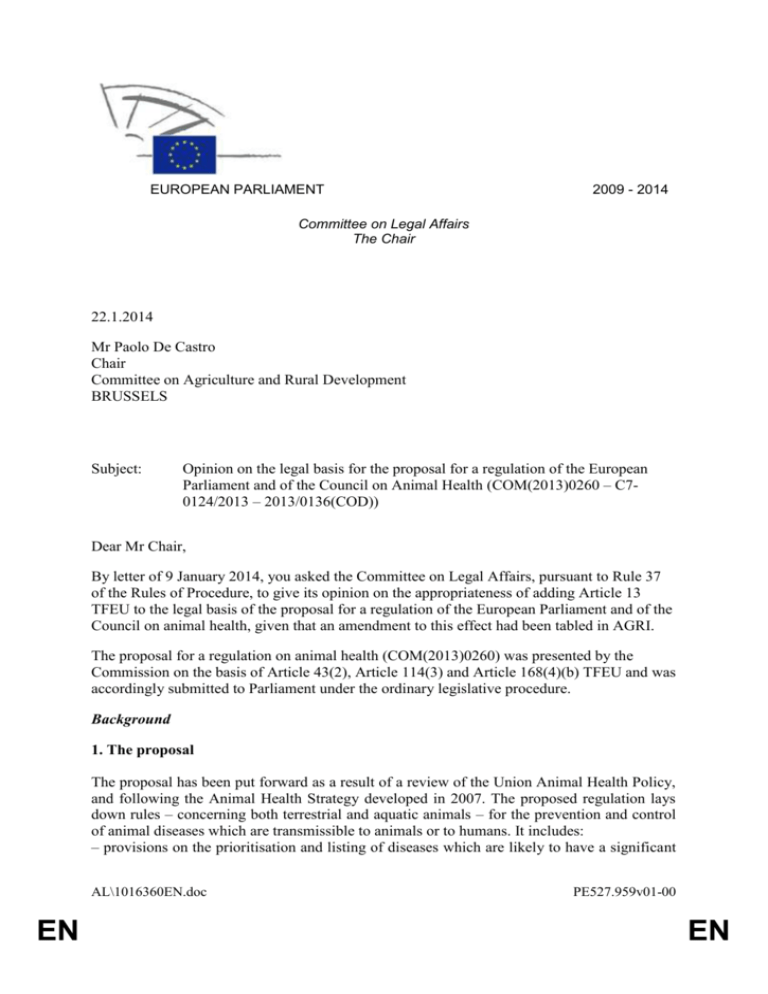
EUROPEAN PARLIAMENT 2009 - 2014 Committee on Legal Affairs The Chair 22.1.2014 Mr Paolo De Castro Chair Committee on Agriculture and Rural Development BRUSSELS Subject: Opinion on the legal basis for the proposal for a regulation of the European Parliament and of the Council on Animal Health (COM(2013)0260 – C70124/2013 – 2013/0136(COD)) Dear Mr Chair, By letter of 9 January 2014, you asked the Committee on Legal Affairs, pursuant to Rule 37 of the Rules of Procedure, to give its opinion on the appropriateness of adding Article 13 TFEU to the legal basis of the proposal for a regulation of the European Parliament and of the Council on animal health, given that an amendment to this effect had been tabled in AGRI. The proposal for a regulation on animal health (COM(2013)0260) was presented by the Commission on the basis of Article 43(2), Article 114(3) and Article 168(4)(b) TFEU and was accordingly submitted to Parliament under the ordinary legislative procedure. Background 1. The proposal The proposal has been put forward as a result of a review of the Union Animal Health Policy, and following the Animal Health Strategy developed in 2007. The proposed regulation lays down rules – concerning both terrestrial and aquatic animals – for the prevention and control of animal diseases which are transmissible to animals or to humans. It includes: – provisions on the prioritisation and listing of diseases which are likely to have a significant AL\1016360EN.doc EN PE527.959v01-00 EN impact (Part I); – provisions on early detection, notification and reporting of diseases as well as surveillance, including animal health visits (Part II); – provision on disease preparedness, awareness and control (Part III), in particular concerning the drawing up of contingency plans, vaccination, as well as control measures to be taken in the case of suspected or confirmed outbreaks of certain diseases; – provisions on registration and approval of establishments and transporters, movements and traceability of consignments of animals, germinal products and products of animal origin (Part IV), with distinct rules for terrestrial, aquatic, and other animals; – standards and requirements for third countries sending animals, germinal products, products of animal origin and other material that may transmit animal diseases into the Union, in order to prevent diseases being introduced, as well as requirements for export (Part V); – emergency measures to be taken in the event of a disease emergency situation (Part VI). 2. The legal bases in question a) Legal basis of the proposal The proposal is based on Article 43(2), Article 114(3) and Article 168(4)(b) TFEU. Those provisions read as follows: Article 43(2) TFEU "2. The European Parliament and the Council, acting in accordance with the ordinary legislative procedure and after consulting the Economic and Social Committee, shall establish the common organisation of agricultural markets provided for in Article 40(1) and the other provisions necessary for the pursuit of the objectives of the common agricultural policy and the common fisheries policy." Article 114(3) TFEU "3. The Commission, in its proposals envisaged in paragraph 1 concerning health, safety, environmental protection and consumer protection, will take as a base a high level of protection taking account in particular of any development based on scientific facts. Within their respective powers, the European Parliament and the Council will also seek to achieve this objective", Article 168(4)(b) TFEU "4. [...] the European Parliament and the Council, acting in accordance with the ordinary legislative procedure and after consulting the Economic and Social Committee and the Committee of the Regions, shall contribute to the achievement of the objectives referred to in this Article through adopting in order to meet common safety concerns: [...] (b) measures in the veterinary and phytosanitary fields which have as their direct objective the protection of public health;" b) Proposed change of the legal basis AGRI has requested the opinion of the Legal Affairs Committee on the appropriateness of adding Article 13 TFEU to the legal basis of the proposal, given that an amendment (AM 69) to this end was tabled in AGRI. A parallel amendment has been tabled in ENVI (AM 192). PE527.959v01-00 EN 2/6 AL\1016360EN.doc Article 13 TFEU reads as follows: "In formulating and implementing the Union's agriculture, fisheries, transport, internal market, research and technological development and space policies, the Union and the Member States shall, since animals are sentient beings, pay full regard to the welfare requirements of animals, which respecting the legislative or administrative provisions and customs of the Member States relating in particular to religious rites, cultural traditions and regional heritage." Analysis Certain principles emerge from the case law of the Court as regards the choice of legal basis. First, in view of the consequences of the legal basis in terms of substantive competence and procedure, the choice of the correct legal basis is of constitutional importance1. Secondly, under Article 13(2) TEU, each institution is to act within the limits of the powers conferred upon it by the Treaty2. Thirdly, according to the case-law of the Court of Justice, "the choice of legal basis for a Community measure must rest on objective factors amenable to judicial review, including in particular the aim and the content of the measure"3. Finally, as regards multiple legal bases, if examination of a EU measure reveals that it pursues a twofold purpose or that it has a twofold component and if one of those is identifiable as the main or predominant purpose or component, whereas the other is merely incidental, the act must be based on a single legal basis, namely that required by the main or predominant purpose or component4. On the other hand, where a measure has several contemporaneous objectives or components which are indissolubly linked with each other without one being secondary and indirect in respect of the others, the measure must be based on the various relevant Treaty provisions5. The Commission put forward Article 43(2), Article 114(3) and Article 168(4)(b) TFEU and explains its choice of legal basis as follows6: – Article 43 TFEU provides the basis for Union legislation regarding the Common Agricultural Policy, and also became the basis for veterinary legislation, the Common Animal Health Policy being considered to be part of the common Agricultural Policy; – Article 114 TFEU provides the legal basis for the establishment and the functioning of the internal market and the approximation of provisions in this respect; – Article 168 TFEU on health protection refers to the protection of human health, including from causes related to animal health. It has provided the legal basis for the adoption of veterinary measures directly aimed at protecting public health. 1 Opinion 2/00 Carthagna Protocol [2001] E.C.R. I-9713, para. 5; Case C-370/07 Commission v Council [2009] E.C.R. I-8917, paras 46-49; Opinion 1/08, General Agreement on Trade in Services [2009] ECR I-11129, para. 110. 2 Case C-403/05 Parliament v Commission [2007] E.C.R. I-9045, para. 49, and the case-law cited therein. 3 See most recently Case C-411/06 Commission v Parliament and Council [2009] E.C.R. I-7585. 4 Case C-42/97 Parliament v Council [1999] E.C.R. I-868, paras. 39-40; Case-C 36/98 Spain v Council [2001] E.C.R. I-779, para. 59; Case C-211/01 Commission v Council [2003] E.C.R. I-8913, para. 39. 5 Case C-165/87 Commission v Council [1988] E.C.R. 5545, para. 11; Case C-178/03 Commission v. European Parliament and Council [2006] E.C.R. I-107, paras. 43-56. 6 COM(2013)0260, Explanatory memorandum, p. 4/5. AL\1016360EN.doc 3/6 PE527.959v01-00 EN In order to establish whether this choice of legal basis is appropriate, as the principles derived from the jurisprudence of the Court indicate, the aim and content of the proposed measure are decisive and, in case of multiple legal bases, the question whether several purposes or components of equal weight can be identified within the proposed act. Indeed, Article 43(2) TFEU provides the general legal basis for the common agricultural policy, under which Parliament and Council establish, apart from the organisation of the agricultural markets, other measures for the pursuit of the objectives of the common agricultural and fisheries policy. The proposal mentions "to ensure [...] the rational development of the agriculture and aquaculture sectors and to increase productivity"(recital 4) as well as "the sustainable agricultural and aquaculture production" (Article 1(2)(a)(i))as one of its objectives. Furthermore, one of the decisive factors for a disease to be included in a list of diseases to which disease specific rules for the prevention and control of diseases apply is the impact of a specific disease "on the agricultural or aquaculture production or related sectors of the economy" (Article 5(a)(ii), Article 6(1) (b)(i)). Furthermore, a number of veterinary measures which the proposal in question is due to replace (cf. Article 258) were based on the previous Article 37 EC, which has now been replaced by Article 43 TFEU. The proposed regulation can therefore, as regards its aim and content, be qualified as a measure under the common agricultural policy legal basis. As regards the internal market legal basis, Article 114 TFEU, it is to be noted that the Commission presents "to contribute to the completion of the internal market" (recital 4) and "the effective functioning of the internal market" (Article 1(2)(a)(ii)) as one of the objectives of the proposed legislation. The measures proposed indeed have a clear dimension of facilitating trade in animals and animal products within the internal market. Registration and approval of items as proposed in Part IV of the regulation are for instance classic internal market instruments. The proposed regulation therefore equally qualifies as a measure for completing the functioning of the internal market. It is thus necessary to include Article 114 TFEU in the legal basis1. Article 168 TFEU lays down in its paragraph 1 the general objective for the Union to ensure a "high level of human health protection". Against this background, Article 168(4) TFEU provides for specific measures to be adopted by the European Parliament and Council under the ordinary legislative procedure, i.e. harmonisation measures in order to meet common safety concerns (Article 168(4) TFEU). More specifically, Article 168(4)(b) TFEU relates to measures in the veterinary field which have as their direct objective the protection of public health. The proposal in question addresses common safety concerns in public health matters as regards animal diseases transmissible to animals or to humans and puts forward specific veterinary measures which have as their direct objective the protection of public health. The protection of public health is repeatedly identified as one of the objectives of this regulation (recitals 2, 4, Article 5(2)(a)(i), Article 6(1)(b)(ii)). Specific health policy measures are for 1 For the sake of completeness it might appear more appropriate to mention Article 114 as a whole and not only Article 114(3) TFEU in the legal basis of the proposed regulation as Article 114 (3) TFEU does not contain a legal basis in itself but merely stipulates that the Commission, in its proposals under Article 114(1) TFEU concerning health, safety, environmental protection and consumer protection, is to take as its base a high level of protection. PE527.959v01-00 EN 4/6 AL\1016360EN.doc instance the provisions on early detection, notification and reporting of animal diseases, on disease awareness and control. As the proposed regulation thus includes measures relating to the common agricultural policy, to the functioning of the internal market and to the protection of public health, it appears appropriate to base the proposal on the corresponding provisions under the TFEU, i.e. Article 43(2), Article 114 and Article 168(4)(b) TFEU. As regards the possible addition of Article 13 TFEU to the legal basis, the justification to AM 69 tabled in AGRI reads as follows: "To include a specific reference to Article 13 of the TFEU, covering animal welfare". The identical AM 192 tabled in the ENVI committee quotes the content of Article 13 TFEU in its justification. Article 13 lays down the general principle and objective for the Union and the Member States to "pay full regard to the welfare requirements of animals" when formulating and implementing certain Union policies. It does not however provide for any specific measures or procedures to this end and is contained in Title II of the TFEU ("Provisions having general application). Thus, Article 13 TFEU defines a relevant objective and does not provide for the adoption of measures. It does not constitute a legal basis. The relevant legal basis providing for Union competence under the principle of conferral is to be derived from specific Treaty provisions, whereas the objectives laid down in Article 13 TFEU are to be taken into account when exercising these competences. In the final analysis, it is considered that it is unnecessary for Article 13 TFEU to be included in a citation as forming part of the legal basis. Should it appear desirable for political reasons to highlight the relevance of Article 13 TFEU to the present piece of legislation, a possibility might be to make reference to this provision in the recitals as has for instance been proposed in AM 5 tabled in the ENVI committee or AM 1 tabled in the PECH committee. In its note dated 15 January 2014 the Parliament's Legal Service equally comes to the conclusion that it is not appropriate to add Article 13 TFEU to the legal basis of the proposal. Legal Affairs Committee recommendation The Legal Affairs Committee considered the above question at its meeting of 21 January 2014. At this meeting, it accordingly decided, by unanimity1, to recommend that the appropriate legal basis for the proposal for a regulation of the European Parliament and of the Council on animal health should be Article 43(2), Article 114 and Article 168(4)(b) TFEU without the addition of Article 13 TFEU. Yours sincerely, 1 The following were present for the final vote: Raffaele Baldassarre, Sebastian Valentin Bodu, Françoise Castex, Christian Engström, Marielle Gallo, Giuseppe Gargani, Lidia Joanna Geringer de Oedenberg, Sajjad Karim, Klaus-Heiner Lehne, Eva Lichtenberger, Antonio Masip Hidalgo, Alajos Mészáros, Angelika Niebler, Bernhard Rapkay, Evelyn Regner, Francesco Enrico Speroni, Rebecca Taylor, Alexandra Thein, Axel Voss, Cecilia Wikström, Tadeusz Zwiefka. AL\1016360EN.doc 5/6 PE527.959v01-00 EN Klaus-Heiner Lehne PE527.959v01-00 EN 6/6 AL\1016360EN.doc
